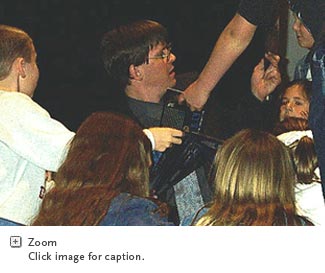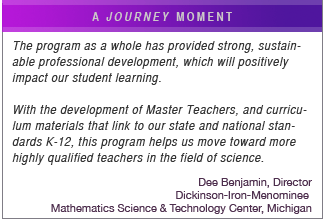|
Journey through the
Universe is a national science education initiative that engages entire
communities—students, teachers, families, and the public—using
education  programs in the Earth and
space sciences and space exploration to inspire and educate. The
initiative embraces the notion that—it takes a community to educate
a child, which is the basis for the program’s Learning Community Model of
program delivery. programs in the Earth and
space sciences and space exploration to inspire and educate. The
initiative embraces the notion that—it takes a community to educate
a child, which is the basis for the program’s Learning Community Model of
program delivery.
The program is overseen
by the National Center for
Earth and Space Science Education (the Center).
We offer an array of
grade K-12 programming, curricular content, and resources that a
community can use to create a customized Journey through the
Universe program—reflecting their strategic
needs in STEM education, growing from local
standards of teaching and learning and NCLB; that can be delivered systemically
across an entire school district; and is
designed to be sustainable.
|
|
Journey through
the Universe content addresses
exploration of the Solar System, galaxy, and Universe; Earth systems
science; the search for extraterrestrial life; building a permanent
human presence in space; and engineering for spaceflight. The content
resides in a library of Grade K-12 Education Modules—compendia of
inquiry-based, hands-on lessons at elementary, middle, and high school
levels—that are used as the ‘curriculum’ for community-wide programming.
Journey through the Universe embraces a pedagogy where science is authentically
portrayed as a seamless fusion of process and content, and as an
innately human endeavor, and where learner as explorer is essential.
Teaming:
Programming is delivered by a National Team of engineers
and scientists, and master science educators—the Visiting Researchers and Visiting Educators—from the
Center and research and education organizations across the nation,
including: NASA field centers and universities. The engineers and
scientists are passionate about their research on the frontier, and are
selected through a national announcement of opportunity to ensure they
are gifted at communicating their passion to audiences of all ages.
 To
implement the program, the community forms a Local Team reflecting the
key partner education organizations: school district(s),
museums/science centers, universities, and appropriate civic and
business organizations. Journey through the Universe provides
a wonderful environment for partnerships between these diverse
stakeholders to flourish. The Local Team should include a curriculum
specialist, and a science educator leadership team—the Master
Science Teachers—that can serve as a sustainable program asset
to teachers across the community. To
implement the program, the community forms a Local Team reflecting the
key partner education organizations: school district(s),
museums/science centers, universities, and appropriate civic and
business organizations. Journey through the Universe provides
a wonderful environment for partnerships between these diverse
stakeholders to flourish. The Local Team should include a curriculum
specialist, and a science educator leadership team—the Master
Science Teachers—that can serve as a sustainable program asset
to teachers across the community.
The Local Team is fully
supported throughout program definition and implementation by the Journey
through the Universe Team at the Center.
Three Main Programming Components
All Journey through the Universe
programming falls into three categories—
- Professional
Development for educators through an array of
workshops, institutes, and distance learning opportunities, at all
grade levels, for all teachers of science (in-service, pre-service, and
museum/science center educators; and science lead teachers). Workshops
for 30-200 attendees are available, with workshop cost independent of
attendance if the community takes on production of the package of
lessons.
- Classroom
Visits by the National Team of Visiting Researchers
traveling to your community to talk to thousands of students—one
classrooms at a time—about what research is like on the frontiers of
exploration. Typically a Week of Classroom Visits—Journey through
the Universe Week—is conducted as part of a multi-week set of
experiences in schools across a district, which is also supported by:
the Journey through the Universe lessons, and professional
development on these lessons well in advance of the Classroom Visits;
and grade-level wide and school-wide activities (a school-wide
enrichment model).
- Family
and Public Programs specifically designed for family
learning, where a ‘performance’ by a Visiting Researcher, each for
100-2,000 attendees, provides parent and child a window on what it’s
truly like to do science, and with program content mated to the
curriculum. The programs are often enhanced with family science
activities, a distance learning connection to a research facility, and
night sky observing. Billed as school functions, typically one to four
Family and Public Programs are held at, e.g., a museum,
science center, or university, while the National Team is in your
community for the Classroom Visits.
Other
Resources: Beyond the library
of Education Modules serving as program content, a suite of other resources are provided to the
community to support programming, and extend the experiences of
students, teachers, families, and the public.
Exhibitions:
As a separate program designed to be consistent with the Learning
Community Model, the Center makes available for permanent installation
a replica of the Voyage Scale Model Solar System on the
National Mall in Washington, DC.
Assessment:
As part of normal program operations, the
Center provides baseline assessment of all
programming, and will work closely with a school district’s division of
evaluation to develop and implement protocols for additional assessment
of strategic impact both in the short term and longitudinally, e.g.,
impact on standardized test scores.
Sustainability:
Programming is designed to be sustainable
in order to make a lasting difference. A variety of elements comprise a
sustainability plan, including: the establishment of a local
infrastructure—a Local Team—that downstream can provide self-sustaining
programming using local resources and free national resources provided by the Center on an ongoing
basis; training of the Local Team on program implementation; and
training of, and community support for, a team of STEM lead
educators—the Master Science Teachers—serving as an enduring local
content and programming asset.
Cost:
Program cost is calculated
on a strictly cost recovery basis, and fully detailed
budgets are submitted to a community as part of a customized proposal
package. We can help you identify organizations in your area
that might be interested in underwriting the program. Given
the wide range of available program options and scope, cost can only be
calculated after a program is customized to a community’s strategic
needs and projected audiences. Examples of program cost for a range of
community programs—e.g., a grade K-12 program for a small
district; or a program addressing all 5th graders for a large urban
district, together with a customized package of lessons implemented as
the 5th grade science curriculum—are provided on the cost page.
|
